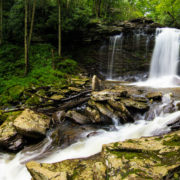2017 Legislative Session Closes – How’s Our Water?
Our water became the most vulnerable it’s been in decades when the 2017 West Virginia legislative session came to a close Saturday night. Going into the 2017 session we were prepared for a challenge, but what we actually experienced was shocking. With each bill weakening water protections, we witnessed first-hand legislators ignoring science, facts and their constituents. When bills were debated and amended, misinformation and propaganda were presented as fact with no opportunity for clarification, purposefully confusing legislators and obscuring the truth. And most alarmingly with the “coal bill,” scientific testimony was silenced from the committee process, leaving only the coal industry lobbyist to speak on changes to water quality standards.
Although this session was grim we’d like to thank legislators who championed water protections: Delegates Fleischauer, Fluharty, Isner, Moore, Pushkin, Pyles and Rowe, and Senators Beach and Miller.
So, where does that leave us? Water protections have taken a giant step backward, putting drinking water at risk for the millions of people who depend on West Virginia’s water. Read below for more information on each anti-water bill passed and what the next steps are to protect our water.
Water Policy Analysis and Next Steps
HB 2811 – exempts of 2,300 oil & gas tanks from the Aboveground Storage Tank Act. It was passed and approved by the Governor on 4/4/17.
What’s Next: We will monitor compliance with the registration and signage requirements restored in the bill. We will continue to research and bring forth the threats oil & gas tank contents pose to drinking water.
SB 687 the “coal bill” – undercuts monitoring and enforcement 
of narrative water quality standards.
What’s Next: We are urging the Governor to veto the bill. If not vetoed, then we will monitor the process for public comment and EPA approval of these changes required under the Clean Water Act.
HB 2506 the “toxic water bill” – allows for an increase in toxins and cancer-causing chemicals in our waters through the permitting process and for overlapping mixing zones, passed and signed by the Governor on 4/8/17.
What’s Next: We will monitor the process for public comment and EPA approval of these changes required by the Clean Water Act.
It’s Not Over Yet
Stay with us! Just because the legislative session is over, that doesn’t mean the work is done. Even though our Legislature acted decisively against water, some of these changes require DEP and EPA to take the next steps, which include public input. We will be sharing information on those opportunities to MAKE SURE citizen’s voices are not left out. We need you to be ready to stand with us and send the message we aren’t going away!
And as we all take a deep breath together, accepting that we have harder work ahead – let’s not forget to make those springtime plans to spend time outside respecting and appreciating our rivers and streams – it’s what we’re fighting for!




 of narrative water quality standards.
of narrative water quality standards.


